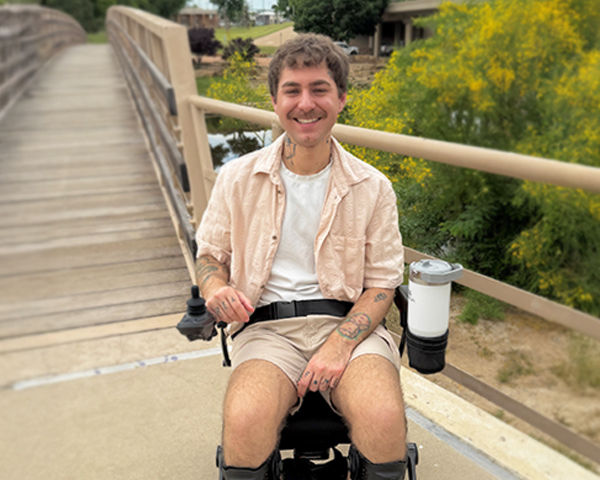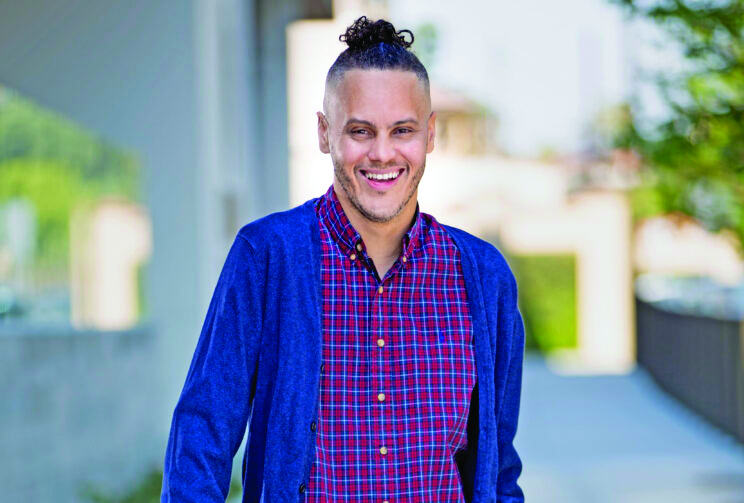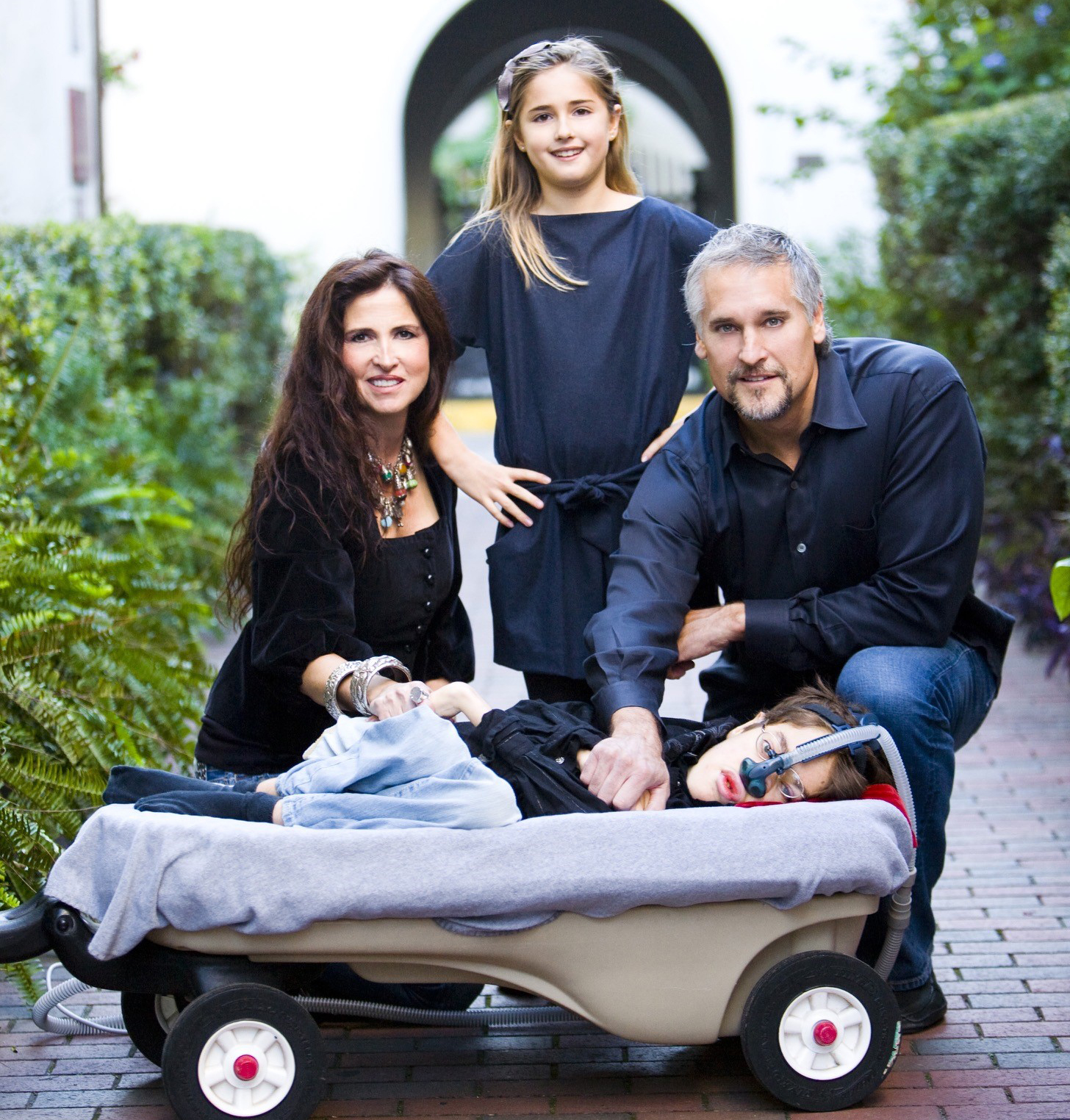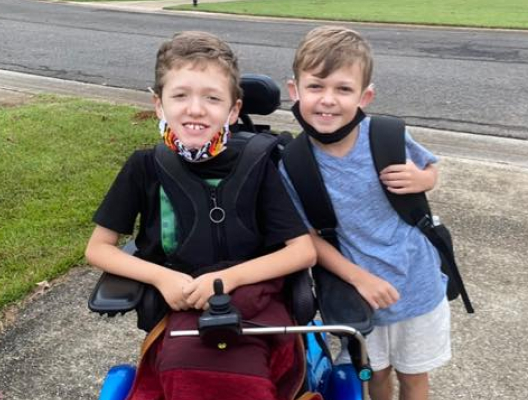

STRENGTHENING the global effort to CURE neuromuscular disease
News Express
Rising Star and Resilient Advocate: James Ian’s SMA Journey

James Ian, an actor, musician, model, public speaker, law graduate, and disability advocate living in Los Angeles, California, has earned recognition for his music, including the award-winning song “SPACES,” and recently showcased his talents in the New York City musical “Most Likely Not To…” The song and musical were productions sponsored by Genentech and support James’ efforts to raise awareness for spinal muscular atrophy (SMA).
Growing up in Maryland, James displayed a passion for the arts from a young age, learning to play the piano at 5 and acting in commercials by age 8. The oldest of four children, James fondly remembers playing outside with his siblings and friends. As he matured, James, his parents, and physicians noticed he appeared clumsy, frequently tripping and slowing down in sports. “I didn’t know what it was; I just felt like I couldn’t quite reach my potential or keep up with other kids. They would make fun of how I ran, but I didn’t know any differently.” Physicians initially attributed James’ limitations to asthma, which was so severe that he had experienced hospitalization.
However, as time passed, James’ condition deteriorated, and he began stumbling more frequently. At 15, he experienced a series of falls that heightened his parents’ concerns. One day, his father observed him using his hands to lift himself from a chair and asked him to try getting up without using his arms. James was unable to do so. His parents sought medical care, and he was initially diagnosed with muscular dystrophy at Georgetown University Hospital. Recognizing the severity of the diagnosis, his parents sought a second opinion at Johns Hopkins. After further testing, including electromyography (EMG), James received the correct diagnosis of SMA type 3.
James describes SMA type 3 to others by saying, “There is a missing or altered gene responsible for carrying signals from the brain to the muscle. And because it’s missing or altered, the muscles don’t receive the signal; they get weak and atrophy.” SMA is rare, and its symptoms can resemble other conditions, making diagnosis challenging. Despite SMA being a degenerative disease, James initially struggled to understand its actual impact on his life. He believed he would retain the strength and mobility he had then for a very long time. However, he quickly learned that would not be the case.
James experienced a growth spurt in his later high school years. At the time of diagnosis, he was 5’6”. By the end of his senior year, he had grown to roughly 6’1”. “Height isn’t great for SMA,” James jokes. “It’s hard to carry that height around.” As he entered college at Georgetown University, known for its hilly terrain, he faced numerous access issues due to stairs and broken elevators. “I was exhausted and reclusive,” James said. He largely kept his SMA journey private during this period, influenced by negative media stereotypes. Overwhelmed by ongoing access issues and feeling isolated, James took a semester break to recuperate.
During his break, a call from a friend who expressed that people missed him, thought he was cool, and wanted to get to know him encouraged James. His father also encouraged him to connect with others and share his journey with SMA, noting, “You never know who you could help by sharing.”
James views this period as a turning point in his life. “That’s when things started to change. I started to open up, be active and social, and have the time of my life!” James became involved in a band, resumed acting, and pursued modeling while continuing his education through law school. As his community grew, he found value in sharing his story and advocating for SMA and disability rights.
Today, James retains much of his ambulatory function. Still, he experiences weakness throughout his entire body, tremors, difficulty using stairs or getting up from a seated position, the inability to run, and falls, from which he struggles to recover on his own. James is now facing stenosis and nerve compression resulting indirectly from his SMA, which has exacerbated his arm weakness, and is considering treatment plans to address it. James often uses a cane and a wheelchair for long distances. He manages his SMA type 3 with regular injections, physical therapy, and 6-month visits to his general physician and his neurologist, Dr. Chamindra Laverty, at the University of California, San Diego.
Dr. Laverty reflects on when she first met James, “I remember how incredibly accomplished he was. Despite a disabling disease, he managed to go to law school, be a musician, and is now pursuing a career as an artist (music). I remember thinking that ‘nothing is going to stop him’ and that I will do everything I can to get him every medicine that makes sense to add to his treatment regimen.” She goes on to say that she has learned from treating James. “[He] developed weakness in one arm over a few months many years ago. I initially thought this was Parsonage Turner, but now, several years later, he started to develop weakness in the other arm. Only then did I realize that the weakness was from nerve root pinching in the neck. It seems like his SMA is destabilizing his cervical (neck) spine at such a young age that his nerves are getting pinched. Now, both arms are weak. I have learned that SMA can cause the spines of ambulatory patients to decompensate at a much earlier age than chronologically expected.”
Despite the challenges of treating SMA, Dr. Laverty remains optimistic, saying, “Research continues to bring hope to SMA patients. Most of our current SMA patients still have weakness, especially if they were treated later in life. These patients are looking for ways to gain more strength, which I think, in my limited experience of adding dual and triple therapy, can yield more strength. Research in SMA gives hope to all SMA patients.”
The ANF also believes research can impact the lives of those with SMA. The ANF supports research through research grants, like that of Dr. Constantin d’Ydewalle’s research topic “LncRNA as Therapeutic Target for SMA” where he focused on an SMN-associated lncRNA that regulates the expression of SMN during neuronal development and differentiation. The ANF also created the Late-Onset Neuromuscular Disease Consortium (LONDC) to help facilitate timely and accurate diagnosis for patients with NMDs such as SMA. These efforts aim to improve the lives of patients like James and others who suffer from NMDs by getting them diagnosis and treatment as quickly as possible and improving their outcomes.
James considers his sources of hope and motivation from the supportive and inspirational people in his life, including his family and friends, SMA My Way, Cure SMA, and various art organizations. He is particularly inspired by Judy Heumann and Chris Smit, who passed away last year and were both strong advocates for those with disabilities. He says, “I’m proud to be disabled,” and that he learned much from them about advocating for those with disabilities and hopes to continue their work. In their honor, he urges people to consider those with disabilities for work opportunities, “Hire people with disabilities - not just in the arts, but everywhere. You’re going to get a lot of talent and a lot of beautiful perspectives by doing that.”
While proud of his disability, James also emphasizes the importance of research for SMA and other NMDs stating, “Everyone deserves to live their strongest, healthiest lives without pain and fatigue. This can be a death sentence for some people. They and their families want to have as much time with their loved ones as possible, and research and treatments are how we do that.”
Support research and education for NMDs like SMA by donating to the ANF today!
Donate Today to Support Research and Researchers' Education
Every dollar raised is a dollar used to support researchers finding a cure. Administrative and staff assistance is provided by AANEM.
Apply for Research Grants & Awards
-
Development Grant Opportunities
-
Neuromuscular Research Grant Opportunities
-
Research and Educational Awards
Upcoming Events
-
ANF Neuromuscular Research Grants Application Deadline
-
ANF Development Grants Application Deadline
-
Resident Scholarship Applications Open
Thank You For Your Support
Together we are helping researchers find treatments and cures for tomorrow and improving the lives of patients with neuromuscular diseases.


